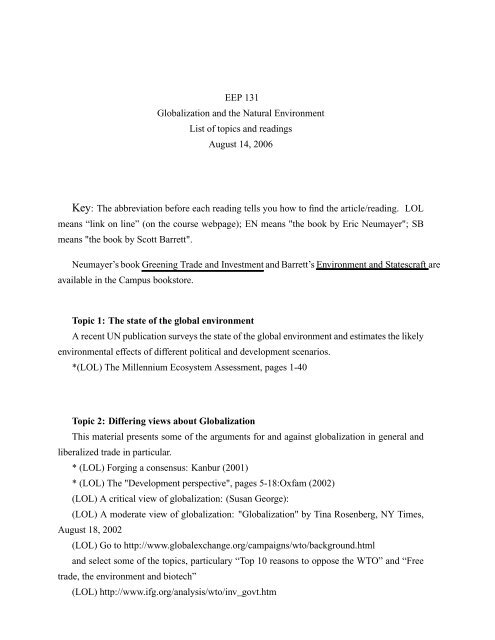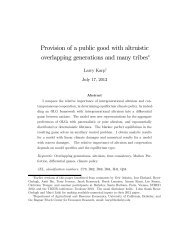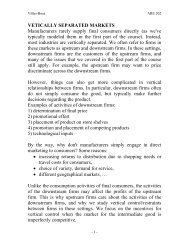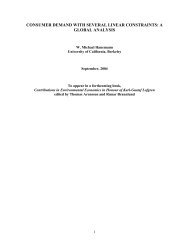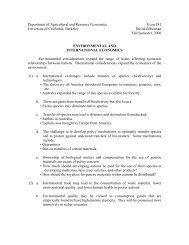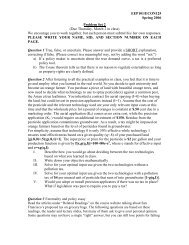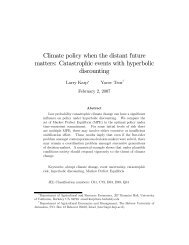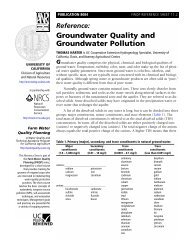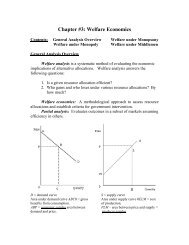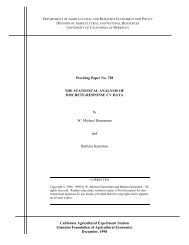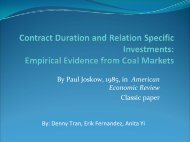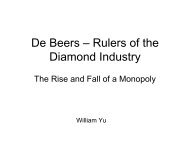Outline of Topics - Agricultural and Resource Economics
Outline of Topics - Agricultural and Resource Economics
Outline of Topics - Agricultural and Resource Economics
You also want an ePaper? Increase the reach of your titles
YUMPU automatically turns print PDFs into web optimized ePapers that Google loves.
EEP 131<br />
Globalization <strong>and</strong> the Natural Environment<br />
List <strong>of</strong> topics <strong>and</strong> readings<br />
August 14, 2006<br />
Key: The abbreviation before each reading tells you how to find the article/reading. LOL<br />
means “link on line” (on the course webpage); EN means "the book by Eric Neumayer"; SB<br />
means"thebookbyScottBarrett".<br />
Neumayer’s book Greening Trade <strong>and</strong> Investment <strong>and</strong> Barrett’s Environment <strong>and</strong> Statescraft are<br />
available in the Campus bookstore.<br />
Topic 1: The state <strong>of</strong> the global environment<br />
A recent UN publication surveys the state <strong>of</strong> the global environment <strong>and</strong> estimates the likely<br />
environmental effects <strong>of</strong> different political <strong>and</strong> development scenarios.<br />
*(LOL) The Millennium Ecosystem Assessment, pages 1-40<br />
Topic 2: Differing views about Globalization<br />
This material presents some <strong>of</strong> the arguments for <strong>and</strong> against globalization in general <strong>and</strong><br />
liberalized trade in particular.<br />
* (LOL) Forging a consensus: Kanbur (2001)<br />
* (LOL) The "Development perspective", pages 5-18:Oxfam (2002)<br />
(LOL) A critical view <strong>of</strong> globalization: (Susan George):<br />
(LOL) A moderate view <strong>of</strong> globalization: "Globalization" by Tina Rosenberg, NY Times,<br />
August 18, 2002<br />
(LOL) Go to http://www.globalexchange.org/campaigns/wto/background.html<br />
<strong>and</strong> select some <strong>of</strong> the topics, particulary “Top 10 reasons to oppose the WTO” <strong>and</strong> “Free<br />
trade, the environment <strong>and</strong> biotech”<br />
(LOL) http://www.ifg.org/analysis/wto/inv_govt.htm
Topic 3: Basic information on institutions<br />
A basic knowledge <strong>of</strong> the important global institutions/agreements is essential for underst<strong>and</strong>ing<br />
their role in the globalization-environment debate. What are the stated objectives<br />
<strong>of</strong> these institutions, what is their involvement with environmental issues, <strong>and</strong> how do they<br />
operate?<br />
* (LOL) UN Environment <strong>and</strong> Trade– a H<strong>and</strong>book (hereafter, simply "H<strong>and</strong>book") pages 1<br />
- 11 <strong>and</strong> pages 21 - 34. United Nations Environmental Programme (1999)<br />
* (EN) Pages 3 - 33.<br />
(LOL) The WTO provisions that relate to Trade <strong>and</strong> Environment are at the link on the<br />
webpage. WTO’s home webpage is http://www.wto.org.<br />
Topic 4: The Link between trade, the environment, <strong>and</strong> policy<br />
This section describes some benefits <strong>of</strong> trade, the interaction between trade <strong>and</strong> the environment,<br />
<strong>and</strong> legal <strong>and</strong> policy issues related to trade <strong>and</strong> the environment.<br />
* (EN) Chapter 7.<br />
* (LOL) H<strong>and</strong>book Chapter 4; .<strong>and</strong> pages 41 – 57 <strong>of</strong> Chapter 5.<br />
(LOL)ArationaleforArticleIII<strong>of</strong>GATT:Readintroduction <strong>and</strong> conclusion <strong>of</strong> Ederington<br />
(2001)<br />
Topic 5: Foreign investment <strong>and</strong> the environment<br />
Trade liberalization may encourage dirty industries to move to countries with weaker environmental<br />
protection. This section considers reasons why this movement might or might not<br />
occur, <strong>and</strong> reviews the empirical literature.<br />
* (EN) Pages 33 - 38 <strong>of</strong> Chapter 2; Chapters 3 <strong>and</strong> 4<br />
* (LOL) Discussion <strong>of</strong> empirical literature on pollution havens. Copel<strong>and</strong> <strong>and</strong> Taylor (2004)<br />
section 3.4 (pages 34 - 54)<br />
(LOL) WTO’s Literature survey on Pollution Havens: Nordstrom <strong>and</strong> Vaughan (1999) ,<br />
chapter 4, pages 35 - 46<br />
(LOL An overview <strong>of</strong> the pollution haven hypothesis: Wheeler (2001)<br />
(LOL) The UN report <strong>of</strong> six case studies: http://www.unep.ch/etu/publications/CSII_Synth.htm.<br />
2
Topic 6: The Environment <strong>and</strong> Investor to State dispute settlement agreements<br />
Chapter 11 <strong>of</strong> NAFTA <strong>and</strong> most Bilateral Investment Treaties allow foreign investors to have<br />
their disputes with host governments heard at international tribunals, rather than in the host’s<br />
domestic court system. This section examines the environmental effect <strong>of</strong> these provisions.<br />
*(EN) Chapter 5<br />
*(LOL) Private Rights, Public Problems, pages 1 - 62 IISD (2001)<br />
*(LOL) Background <strong>of</strong> "theory <strong>of</strong> takings", article from The Nation, Greider (2001)<br />
(LOL) Public Citizen’s view <strong>of</strong> Chapter 11, especially pages i – xi <strong>and</strong> 1 –7<br />
(LOL) Institute for International <strong>Economics</strong> working paper, Mann <strong>and</strong> von Moltke (2002)<br />
(LOL) Do host governments treat multinationals worse than domestic firms? Huang (2005).<br />
Topic 7: Trade-Environment disputes<br />
Specific trade-<strong>and</strong>-environment disputes are sometimes invoked to illustrate the harmful effects<br />
<strong>of</strong> globalization in general, <strong>and</strong> specifically the WTO or NAFTA. What were the disputes<br />
really about, what was the role <strong>of</strong> the WTO or NAFTA, <strong>and</strong> what are the arguments for the<br />
various positions?<br />
*(EN) Chapter8<br />
* (LOL) Summaries: Vogel (2000)<br />
(LOL) Shrimp <strong>and</strong> Turtles: Cone (2002)<br />
(LR) Political Economy <strong>and</strong> Dolphins, Korber (2000), chapter 5<br />
(LOL) The WTO’s summary <strong>of</strong> disputes:<br />
http://www.wto.org/english/tratop_e/envir_e/edis00_e.htm<br />
(LOL) An online journal that collects informationontrade<strong>and</strong>environmentdisputes:TED<br />
(http://www.american.edu/TED/class/all.htm)<br />
Topic 8: Linking trade <strong>and</strong> the environment in international institutions<br />
The main objective <strong>of</strong> the WTO is to reduce trade barriers. Some people argue WTO<br />
objectives should be broadedned to include environmental goals.<br />
* (LOL) H<strong>and</strong>book pages 11 - 21<br />
3
*(LOL) The basic idea <strong>of</strong> linked bargains (Pages 185 - 192) Horstmann, Markusen, <strong>and</strong><br />
Robles (2005)<br />
* (LOL) Should the WTO be exp<strong>and</strong>ed to balance “non-trade” interests? (Especially pages<br />
1 - 15): Guzman (2002)<br />
*(LOL)Ajustification for the current separation <strong>of</strong> trade <strong>and</strong> environmental issues.(JEP<br />
article) Bagwell <strong>and</strong> Staiger (2001)<br />
* (LOL) Policy coherence between MEAs <strong>and</strong> the WTO:.Sampson (2002)<br />
Topic 9: The problem <strong>of</strong> international cooperation<br />
*(SB) Chapters 1 - 4<br />
Topic 10: Game theory applied to Multilateral Environmental Agreements (MEAs)<br />
*(SB) Chapters 6-7<br />
* (LOL) The relation between public goods <strong>and</strong> the Coase Theorem: Introduction <strong>and</strong> conclusion<br />
<strong>of</strong> Dixit <strong>and</strong> Olson (2000)<br />
(LOL) See how complicated things get: Introduction <strong>and</strong> conclusion <strong>of</strong> Ray <strong>and</strong> Vohra<br />
(2001)<br />
Topic 11: Climate change <strong>and</strong> the Kyoto Protocol<br />
Some environmentalists are concerned that the rules <strong>of</strong> various MEAs <strong>and</strong> the WTO might<br />
conflict. The desire to avoid this possibility might have a chilling effect on the creation <strong>of</strong><br />
MEAs. This section provides an overview <strong>of</strong> existing MEAs <strong>and</strong> explains their relation to the<br />
WTO. The trade implications <strong>of</strong> the Kyoto agreement are emphasized.<br />
*(SB) Chapter 15<br />
* (LOL) A political economy perspective <strong>of</strong> the WTO <strong>and</strong> Kyoto: Eckersley (2004)<br />
(LOL) Kyoto <strong>and</strong> the WTO – an overview from economists: Zhang <strong>and</strong> Asuncao (2004)<br />
4
Topic 12 The <strong>Resource</strong> Curse<br />
There is a negative correlation between economic growth <strong>and</strong> the economic importance <strong>of</strong><br />
the resource-intensive sector. Why do countries that are relatively well endowed with natural<br />
resources appear to grow relatively slowly?<br />
* (LOL) Overview <strong>and</strong> critique <strong>of</strong> economic <strong>and</strong> political explanations: Ross (1999)<br />
* (LOL) The importance <strong>of</strong> the type <strong>of</strong> resource: Isham, Pritchett, Woolcock, <strong>and</strong> Busby<br />
(2002) (Read pages 1 - 19; read section IV, pages 29 - 41.)<br />
* (LOL) Using a measure <strong>of</strong> "real income growth" Neumayer (2003)<br />
(LOL) The case <strong>of</strong> Nigeria: Sala-i-Martin <strong>and</strong> Subramanian (2003) (Read pages 1 -7; skim<br />
pages 8 - 11; read summary <strong>of</strong> results on page 12; skim section III; read section IV<br />
(LOL) <strong>Resource</strong>s <strong>and</strong> the big push: (pages 43 - 52) Sachs <strong>and</strong> Warner (1999)<br />
Topic 13: Agriculture<br />
Western agricultural subsidies <strong>and</strong> trade barriers encourage intensive production in the West,<br />
resulting in high input use <strong>and</strong> low world prices. Thesepolicieshavedirectenvironmental<br />
effects in Western countries, due to increased input use. Since these policies lower world<br />
prices for agricultural goods, they also lower the income <strong>of</strong> agricultural producers in developing<br />
countries There is concern that agricultural trade might result in the loss <strong>of</strong> genetic diversity if<br />
imports “crowd out” local varieties; the spread <strong>of</strong> genetically modified products might lead to<br />
environmental damage.<br />
* (LOL) Oxfam’s view <strong>of</strong> the effects on poor countries <strong>of</strong> OECD subsidies (chapter 4):<br />
http://www.maketradefair.com/ (then click “trade report”)<br />
* (LOL) Estimates <strong>of</strong> the effects <strong>of</strong> agricultural reform (especially pp 3- 13 <strong>and</strong> 29 - 31),<br />
Beghin, Rol<strong>and</strong>-Holst, <strong>and</strong> van der Mensbrugghe (2002)<br />
(not yet online) Agroindustrialization <strong>and</strong> globalizaton: Barrett, Barbier,<strong>and</strong>Reardon(2001)<br />
(LOL) US-Mexico corn trade: Ackerman, Ney, Gallagher, <strong>and</strong> Flores (2002)<br />
(LR) NAFTA <strong>and</strong> the Mexican corn sector, <strong>and</strong> environmental linkages (chapter 8): Deere<br />
<strong>and</strong>Esty(2002)<br />
5
(LOL OECD Policy Review<br />
(LOL) OECD Review <strong>of</strong> Ag policies <strong>and</strong> environmental effects<br />
(LOL) IATRC report<br />
(LOL)Cost<strong>of</strong>protection(Andersonetal.)?<br />
6
References<br />
ACKERMAN, F.,L.NEY, K.GALLAGHER, AND R. FLORES (2002): “Environmental impacts<br />
<strong>of</strong> the changes in US-Mexico Corn Trade under NAFTA,” Tufts University Working Paper.<br />
BAGWELL, K., AND R. STAIGER (2001): “The WTO as a mechanism for securing market<br />
access property rights: implications for global labor <strong>and</strong> environmental issues,” Journal <strong>of</strong><br />
Economic Perspectives, 15(3), 69–88.<br />
BARRETT, C.,E.BARBIER, AND T. REARDON (2001): “Agroindustrialization, globalization<br />
<strong>and</strong> international development: the environmental implications,” Environment <strong>and</strong> Development<br />
<strong>Economics</strong>, 6, 419–433.<br />
BEGHIN, J.,D.ROLAND-HOLST, AND D. VAN DER MENSBRUGGHE (2002): “<strong>Agricultural</strong><br />
Trade <strong>and</strong> the Doha Round,” .<br />
CONE, S. M. (2002): “The Environment <strong>and</strong> the World Trade Organization,” New York Law<br />
School working paper.<br />
COPELAND, B.,AND M. TAYLOR (2004): “Trade, Growth <strong>and</strong> the Environment,” Journal <strong>of</strong><br />
Economic Literature, XLI(1), 7–71.<br />
DEERE, C.,AND D. ESTY (2002): Greening the Americas: Nafta’s Lessons for Hemispheric<br />
Trade.MITPress,CambridgeMA.<br />
DIXIT, A.,AND M. OLSON (2000): “Does Voluntary Participation undermine the Coase Theorem,”<br />
Journal <strong>of</strong> Public <strong>Economics</strong>, 76, 309 – 335.<br />
ECKERSLEY, R. (2004): “The Big Chill: The WTO <strong>and</strong> multilateral Environmental Agreements,”<br />
Global Environmental Politics, 4(2), 24 – 50.<br />
EDERINGTON, J. (2001): “International coordination <strong>of</strong> trade <strong>and</strong> domestic policies,” American<br />
Economic Review, 91(5).<br />
GREIDER, W. (2001): “The Right <strong>and</strong> US Trade Law,” The Nation, October 15.<br />
GUZMAN, A. (2002): “Global Governance <strong>and</strong> the WTO,” UC Berkeley School <strong>of</strong> Law Research<br />
Paper No. 89.<br />
7
HORSTMANN, I.J.,J.R.MARKUSEN, AND J. ROBLES (2005): “Issue linking in trade negotiations:<br />
Ricardo Revisited or No Pain No Gain,” Review <strong>of</strong> International <strong>Economics</strong>, 13,<br />
185– 204.<br />
HUANG, Y. (2005): “Are foreign firms priveleged by their host governments?,” MIT Sloan<br />
School <strong>of</strong> Management Working Paper No 4538-04.<br />
IISD (2001): Private Rights, Public ProblemsInternational Institute <strong>of</strong> Sustainable Development,<br />
http://www.iisd.org/publications/orderform.asp.<br />
ISHAM, J.,L.PRITCHETT, M.WOOLCOCK, AND G. BUSBY (2002): “The varietries <strong>of</strong> Rentier<br />
Experienmce: How natural resource endowments affect the political economy <strong>of</strong> economic<br />
growth,” World Bank Working Paper.<br />
KANBUR, R. (2001): “Economic Policy, Distribution <strong>and</strong> Poverty: the Nature <strong>of</strong> Disagreements,”<br />
World Development, 29, 1083–1094.<br />
KORBER, A. (2000): The Political Economy <strong>of</strong> Environmental Protectionism. Edward Elgar,<br />
Cheltenham, UK.<br />
MANN, H.,AND K. VON MOLTKE (2002): “Protecting Investor Rights <strong>and</strong> the Public Good,” .<br />
NEUMAYER, E. (2003): “Does the <strong>Resource</strong> Curse hold for growth in genuine income as<br />
well?,” London School <strong>of</strong> <strong>Economics</strong> Working Paper.<br />
NORDSTROM, H., AND S. VAUGHAN (1999): Trade <strong>and</strong> the Environment. WorldTrade<br />
Oranization.<br />
OXFAM (2002): “Rigged rules <strong>and</strong> double st<strong>and</strong>ards: trade, globalization <strong>and</strong> the fight against<br />
poverty,” www.maketradefair.com.<br />
RAY, D.,AND R. VOHRA (2001): “Coalitional Power <strong>and</strong> Public Goods,” Journal <strong>of</strong> Political<br />
Economy, 109(6), 1355 – 1382.<br />
ROSS, M. L. (1999): “The political economy <strong>of</strong> the resource curse,” World Politics, 51(2),<br />
297–322.<br />
SACHS, J., AND A. WARNER (1999): “The big push, natural resource booms <strong>and</strong> growth,”<br />
Journal <strong>of</strong> Development <strong>Economics</strong>, 59, 43–76.<br />
8
SALA-I-MARTIN, X., AND A. SUBRAMANIAN (2003): “Addressing the Natural <strong>Resource</strong><br />
Curse: an Illustration from Nigeria,” NBER Working Paper 9804.<br />
SAMPSON, G. (2002): “WTO Rules <strong>and</strong> Climate Change,” .<br />
UNITED NATIONS ENVIRONMENTAL PROGRAMME (1999): Environment <strong>and</strong> Trade – a<br />
H<strong>and</strong>book. United Nations, http://www.unip.ch.etu.<br />
VOGEL, D. (2000): “The environment <strong>and</strong> international trade,” Journal <strong>of</strong> Policy History, 12,<br />
72–100.<br />
WHEELER, D. (2001): “Racing to the Bottom: Foreign investment <strong>and</strong> air pollution in developing<br />
countries,” Journal <strong>of</strong> environment <strong>and</strong> development, 10, 225–245.<br />
ZHANG, Z.,AND L. ASUNCAO (2004): “Domestic ClimatePolicies<strong>and</strong>theWTO,”The World<br />
Economy, 27(3), 359 – 386.<br />
9


